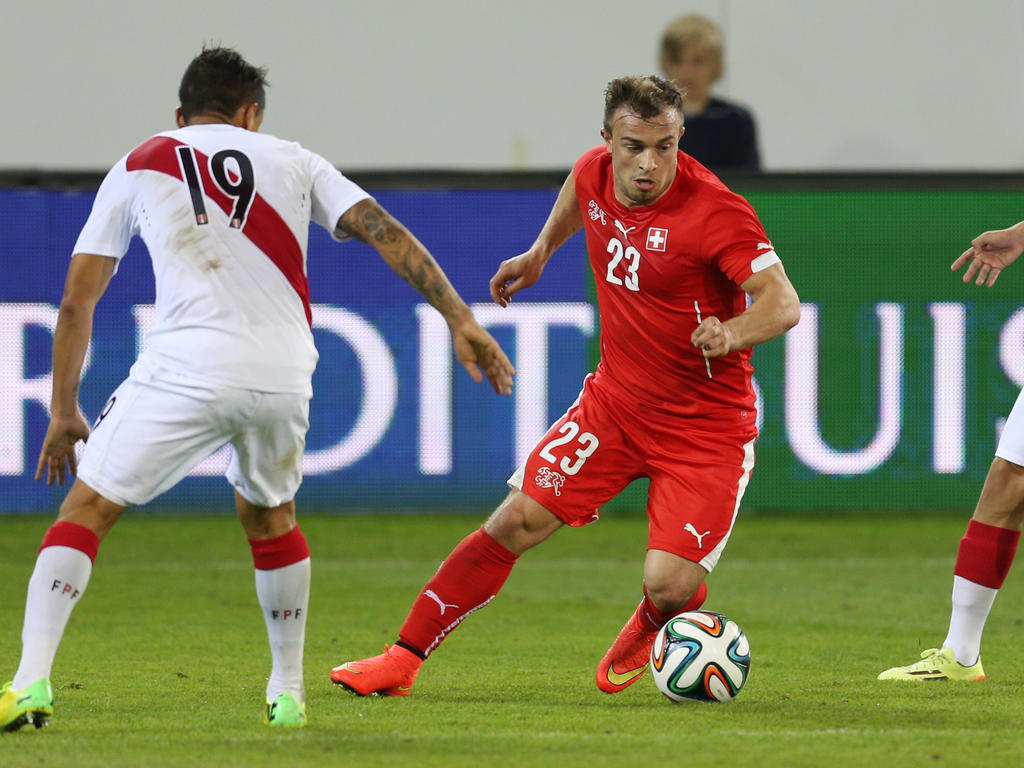Balkan boys hit the big time with Switzerland

If Switzerland claim scalps at the World Cup they may owe a big thanks to unlikely heroes -- immigrants like Xherdan Shaqiri.
About half the squad for a country that voted narrowly in a January referendum to limit the influx of foreigners is made up of men with roots in the Balkans, Italy, Spain and Turkey. The World Cup in Brazil marks a coming of age for a young Switzerland side with their own take on "rainbow" teams.
Shaqiri, 22 and one of the most exciting attacking midfielders in Europe, was a toddler when he moved to Switzerland in 1991 with his parents from Kosovo -- one of many Balkan regions which produced hundreds of thousands of war refugees at that time.
Now with Bayern Munich in Germany, "XS", as he is known, is reportedly at the centre of a big money move to Liverpool.
"I get embarrassed when I hear fans chanting my name. It makes me uneasy, because we're a team," he told the daily 20Minutes newspaper.
"We play for Switzerland and we're proud to give our all," said 21-year-old midfielder Granit Xhaka, of Germany club Borussia Monchengladbach.
"Many of us have a second passport, and we draw a lot from that, from our blood, our roots," Xhaka, who was born to Kosovar parents in Basel, told Swiss newspaper Le Matin Dimanche.
Despite January's vote, diversity is nothing new to Switzerland where the north and east is German-speaking, the west French, and the south Italian. The wealthy country has also drawn migrants for decades.
According to official data, 35 percent of Switzerland's eight-million population is either foreign or has non-Swiss roots. Among footballers, the proportion probably tops 50 percent, said Raffaele Poli, head of the Swiss-based CIES Football Observatory.
"There's not actually a major over-representation of foreign-origin players in the Swiss senior squad compared to the footballing population," he told AFP.
Italy is Switzerland's top source of migrants.
Big-name Swiss footballers of Italian stock include Umberto Barberis in the 1970s and 1980s and Ciriaco Sforza, who was a key player at the 1994 World Cup.
In today's squad, goalkeeper Diego Benaglio and midfielder Tranquillo Barnetta have Italian roots.
The Turkish-origin community produced the iconic Kubilay Turkyilmaz, brothers Murat and Hakan Yakin, and current captain Gokhan Inler.
Young star Ricardo Rodriguez has Spanish and Chilean roots, and fellow defender Philippe Senderos is half-Spanish, half-Serbian.
The Swiss-Balkan community began with seasonal workers who came from Yugoslavia in the 1970s, and expanded after Switzerland admitted war refugees in the 1990s.
The first Kosovar to play for the "Nati" was Milaim Rama in 2003. He was followed by midfielder Valon Behrami, now 29, and in the squad since 2005.
Behrami and Inler play for Italian club Napoli, like Swiss-born Blerim Dzemaili, whose parents who are ethnic Albanians from Macedonia. Admir Mehmedi, of Germany's Freiburg, is Macedonian-Albanian.
The issue of players whose roots lie abroad sparks little debate.
"They all say how much they owe Switzerland and that they are happy to return something through football," said national coach Ottmar Hitzfeld, himself a German.
"They have benefited from a great education in school, professionally and in terms of football. Now they want to ensure that Switzerland is proud of them. This is an example of a great motivation in a field where fast money plays a big role and can quickly turn someone's head."
Sports Minister Ueli Maurer -- whose Swiss People's Party are immigration hawks -- lauds their contribution.
"Half of our national football team comprises of players from your community, so that qualification for Brazil is indeed a merit of members of your community," Maurer said during a visit to Kosovo several months ago.
Switzerland's 170,000-strong Kosovar community, mostly ethnic Albanians, are fiercely proud. "For the Albanian-Swiss community, they are symbols and stars, created by the opportunities this country has offered them," said Skender Bucpapaj, who runs an Albanian-language news portal.
"They all fight for Switzerland's victory to express their gratitude," he told AFP.
Ironically, Switzerland sealed their World Cup berth with a 2-1 away win over Albania.
Switzerland benefits from Kosovo not being allowed to field a team in international competitions, due to a dispute with former ruler Serbia.
Some other Balkan countries have taken back Swiss expatriates. Ex-Swiss youth players at the World Cup include Croatia's Ivan Rakitic and Bosnia's Izet Hajrovic.
But Switzerland still boasts Croatian-origin Josip Drmic -- who's just signed for Bayer Leverkusen in Germany -- and Bosnian-origin Haris Seferovic of Spaniards Real Sociedad.
The Swiss Football Association says the squad makeup is the fruit of a sweeping talent programme launched in 1994.
All the players are considered Swiss, said Yves Debonnaire, youth manager for the past 16 years. "Our strategy has been to build up from youth level, to create elite footballers, regardless of background," he told AFP.
"We were at the World Cup in 2006, at the World Cup in 2010 and now we're at the 2014 World Cup. For a small country like Switzerland, that's a pretty competitive performance!"






